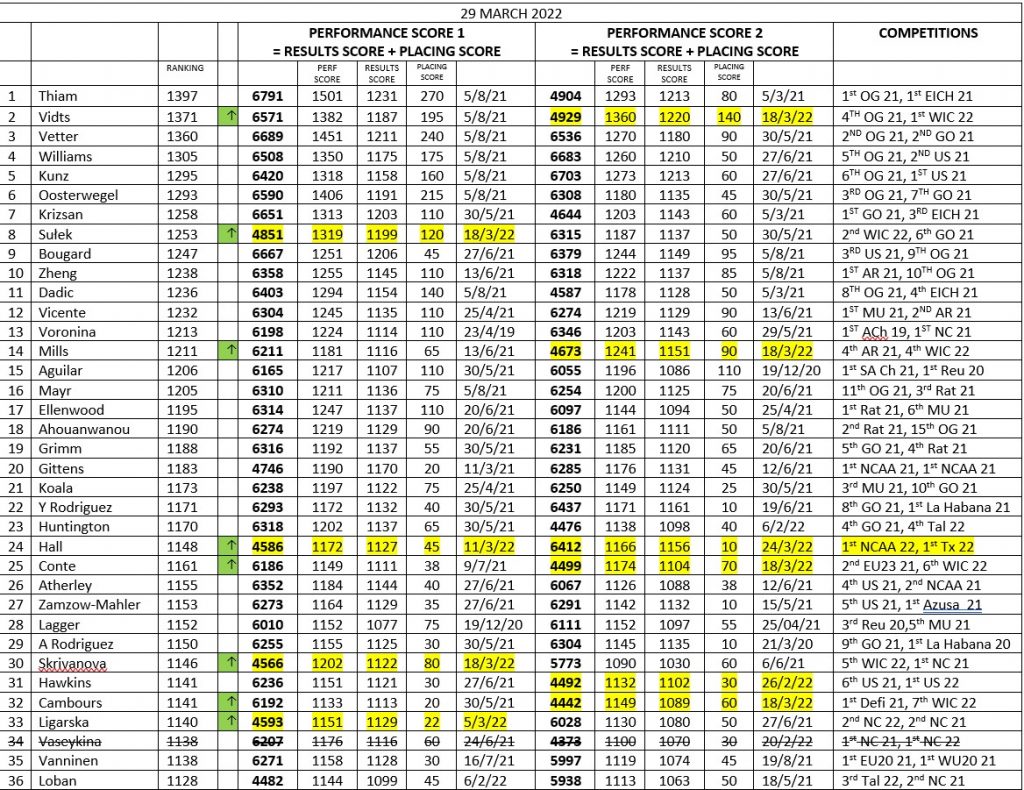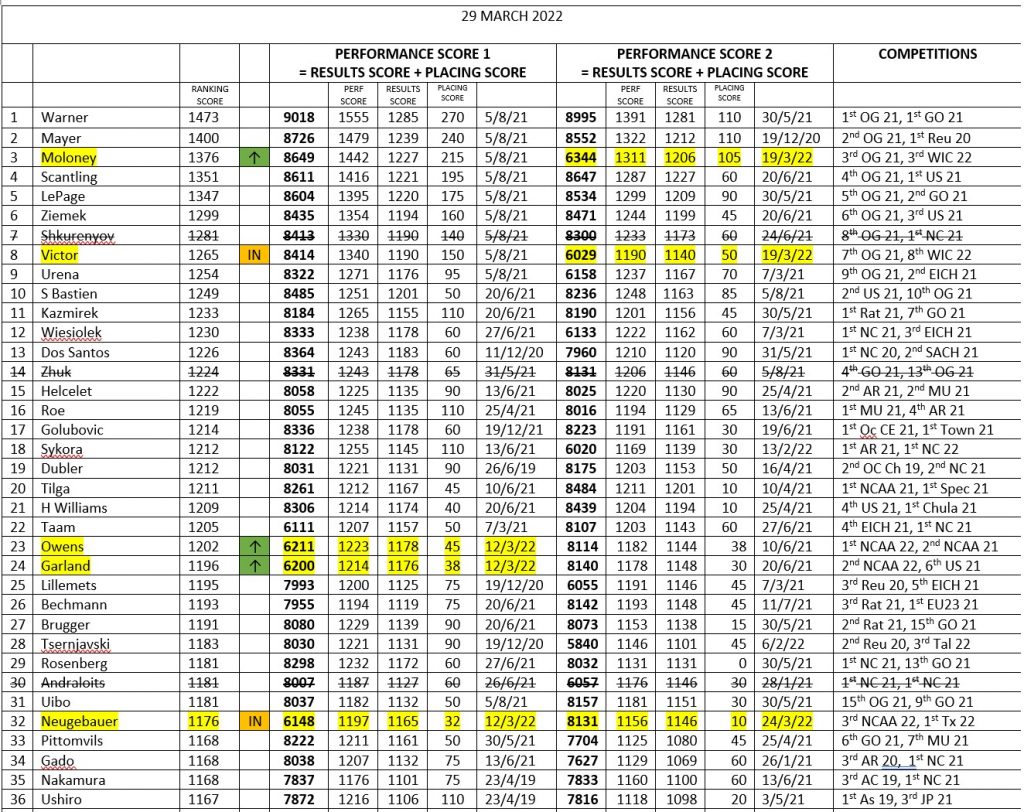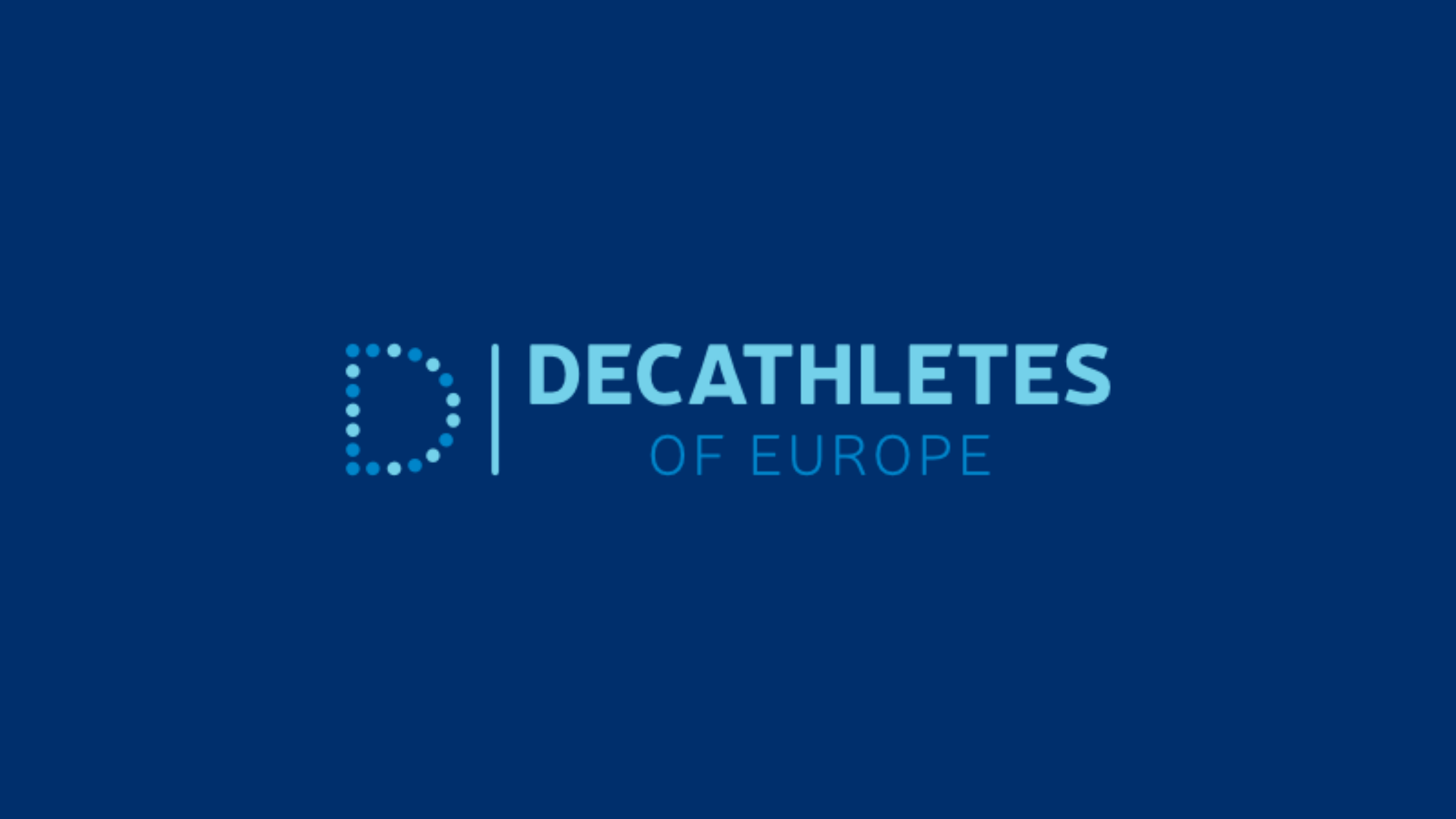This is the third in a new regular series of posts providing an analysis of key developments in qualification for major championships, and the current world rankings for combined events.
You can read the introductory post which highlights case studies from 2020 and 2021, and identifies issues to consider when planning a strategy for qualification.
You can read previous rankings analysis and a full description of the rankings system here.
We last did a rankings analysis on 22 February, as the qualification period for the World Indoor Championships drew to a close. The rankings faded into the background as we waited for the final Belgrade entry lists to settle, amidst multiple withdrawals and last-minute invitations.
So, let’s catch up on the consequences of the World Championships, the conclusion of the indoor season, and the first few outdoor competitions of 2022.
HEPTATHLON/PENTATHLON
First, the US indoor championships. Chari Hawkins’s victory on 26 February not only secured her selection for Belgrade but moved her up eight places from 37th to 29th place. Her score of 4492 replaces her 5961 from Multistars in 2021. Her win in Spokane gave her 1102 performance points and 30 placing points, compared to 1092 and 25 respectively for 10th place at Multistars.
However, Chari’s DNF in Belgrade means that she did not improve on that position and was subsequently bumped down to 31st place.
It is worth pausing to examine the interaction between the placing points element of the rankings and the restricted field sizes at the World Indoors.
Placing points are available for the top 12 finishers in the combined events at World champs. The field is limited to 12. If you turn up and finish, you get a minimum of 45 placing points to add to your performance points.
In both the pentathlon and the heptathlon at the championships, only ten athletes finished. That’s a modest drop-out rate for combined events. But it means no-one collected the 50 placing points for finishing 11th, and no-one collected the 45 placing points for finishing 12th.
For context, only 20 points or so separate the athletes in 24th and 32nd in the men’s rankings. Fifty extra placing points could theoretically be the difference between qualifying and not qualifying for a field of 24 at the World Championships. But the restricted indoor field size means that instead of those points being available for qualification for the restricted outdoor fields, they went straight into the bin – unused and wasted.
Back to pre-Belgrade competition, and the same weekend Chari Hawkins was winning the US championships pentathlon, Anna Hall was winning the SEC championships in College Station.
Hall scored 4618; a world lead at the time and over 120 points higher than Hawkins. It also replaced Hall’s 4590 (from January 2021) in her ranking calculation.
While Hall’s 4618 received a performance score of 1136, it attracted only 10 placing points, compared to Hawkins’ 30, and Hall moved up just one place from 33rd to 32nd. However, Hall’s win at the NCAAs a couple of weeks later in 4586 – some 30 points lower than her SEC score – attracted 45 placing points. That moved her up to 29th place, ahead of Hawkins.
So, Hall’s lower pentathlon score was more valuable to her ranking than her higher pentathlon score.
Hall then scored a lifetime best of 6412 in her opening heptathlon at the Texas Relays. However, the score only gave her 10 placing points, and she only moved up to 24th place. By way of comparison, look at Ivona Dadic’s position in 11th place in the rankings (see diagram below). Hall’s scores are almost identical to Dadic’s – and remember Hall also has a 4600+ pentathlon this year – but Dadic’s more generous placing points keep her much higher. Hall is just 8 points away from automatic qualification for Oregon, but to avoid suffering the same fate as Tyra Gittens in 2021, she will need to go above 6420 to ensure she is in contention for selection.
In late February there was the sad news that Canada’s Georgia Ellenwood, after such a wonderful 2021 season, had ruptured her achilles. However, Ellenwood’s ranking position in 17th is based on her scores from Multistars and Ratingen in the summer of 2021, and they are valid for 18 months. So, while she might drop as others improve their position, Georgia should not plummet out of the rankings in the way that world champion Katarina Johnson Thompson did when her Olympics DNF cancelled out her World Championships win in the rankings.
Speaking of KJT, the defending World indoor champion received the 12th discretionary place for Belgrade. She did not finish the competition, but even had she done so, it wouldn’t have been enough to get her back in the rankings, since she has no eligible outdoor score. Rankings must include one “main event”; the heptathlon for women and the decathlon for men. The last heptathlon KJT finished (other than Doha) was in Götzis in 2019, well outside the eligible 18-month period. However, as reigning World champion, she has a wildcard for Oregon, so the rankings are moot for her.
One athlete dropped out of the rankings at the end of February, Ireland’s Kate O’Connor. She was previously 46th – and had been much higher in previous years – but the expiry date arrived on her indoor performance from early 2020, leaving only her 6297 from Multistars 2021 eligible.
Most of the athletes who did well in Belgrade enjoyed a boost in their rankings. Belgium’s Noor Vidts overtook the Netherlands’ Anouk Vetter for second place, Vidts’ outstanding national record of 4929 for gold replacing her 4791 for silver in Toruń last year.
Adrianna Sułek continued her impressive climb upwards, landing in eighth place overall (having started the season in 18th) as a result of 4851 for silver in Belgrade.
Holly Mills also enjoyed a valuable boost from 20th place, where she was after her competition in Tallinn in February, to 14th place after her 4673 for fourth place in Belgrade.
Also from Belgrade, Claudia Conte landed in 24th place after starting the year in 28th, Dorota Skřivanová improved further from 39th to 30th, and Leonie Cambours 34th to 32nd (her lower score of 4442 in Belgrade more valuable than her 4457 in Clermont Ferrand).
And spare a thought for Poland’s Paulina Ligarska. She enjoyed a big PB of 4593 to finish second at the Polish championships – fourth in the world at the time – but it was too late for qualification for Belgrade and only boosted her ranking by one place after the bonuses from the World Championships had been awarded.
The other athlete whose position changed within the top 50 rankings was Sweden’s Bianca Salming, who dropped from 36th to 42nd as her indoor national championships title from 2020 expired, replaced by her 5757 heptathlon in Sollentuna last year.

RUSSIAN AND BELARUSSIAN ATHLETES
The full implications of the sanctions against the states of Russia and Belarus have not yet been worked through in full. While World and European Athletics have made clear that athletes from those countries will not be permitted to compete in either the World or European championships, they still appear in the rankings.
That includes Viktoria Vasekyina (who has ANA status for 2022) who sits in 34th place in the rankings after her victory at the Russian indoor championships.
In the men’s field, there are currently three athletes in the top 30 who will not be eligible to compete in Oregon or Munich: Ilya Shkurenyev (currently in seventh), Vitaly Zhuk (14th) and Maksim Andraloits (30th). Artem Makarenko was originally qualified for the World Indoors thanks to his early season heptathlon performance, but he does not appear in the rankings since he does not have an eligible decathlon score within the qualifying period. Makarenko’s ANA status and inclusion in the 2022 ANA championships quota was confirmed ahead of the sanctions taking effect; Shkurenyev’s was not.
DECATHLON/HEPTATHLON
Ash Moloney’s performance to win bronze at the World Indoors moved him from fourth to third in the overall rankings, his 6344 points knocking out his 8103 from the 2019 Oceania Championships. It’s a curiosity of the system that his 8103 was deemed to be worth more than his 8400+ in December 2020 and his 8200+ in April 2021 against practically identical opposition. Of course, it is moot for qualification purposes since the Australian has outright qualifying scores.
As reported in February, Lindon Victor of Grenada had dropped out of the rankings over the winter as his 2019 performances expired, with no second eligible score to accompany his Olympic mark. But he remedied that with his national record of 6029 in Belgrade and was a re-entry in eighth position. Again, irrelevant for him since he has already reached the World qualifying standard.
Andri Oberholzer of Switzerland entered the top 50 rankings for the first time, sitting in 40th place, thanks to his fifth place in Belgrade. We should expect him to climb much higher, since his sole eligible decathlon score is his 7615 from August 2021, and he should be over 8000 points this year.
However, his teammate Simon Ehammer, the silver medallist in Belgrade, is still not yet ranked. His 8000+ decathlons of 2020 were all within the Covid blackout period, and he did not finish a decathlon in 2021. He should come crashing into the top end of the rankings with his first decathlon of 2022.
We should also expect the arrival of Estonian Hans Christian Hausenberg, fourth in Belgrade, in the rankings and he should be looking forward to his first decent decathlon score this summer.
This week Germany’s Tim Nowak dropped out of the top 100 rankings. He had been positioned in 43rd until his 5883 heptathlon from Clermont Ferrand in January 2020 expired. After his freak pole vault hand injury in Ratingen in 2021, Nowak’s best eligible decathlon score was his 7931 to win the German championships later that year. The only other valid score was his 5083 from 6 events (he no heighted in the pole vault, but ran the 1000m) in Tallinn in February 2021, keeping him ranked, but outwith the top 100.
As for the women’s competition, the significant movement in the rankings arose in the NCAA college circuit.
Puerto Rico’s Ayden Owens moved from 26th to 23rd in the rankings as the indoor season came to a close. He received more placing points for his 6211 to win the NCAAs than he did for his superior 6272 a few weeks previously at the Razorback Invitational in Fayetteville. His competition on both occasions? The same man, Kyle Garland. Garland’s 6205 in College Station a few weeks later placed him 27th, his 6200 at the NCAAs moved him up to 25th. Go figure.
While Tim Nowak headed out of the top 100, his compatriot Leo Neugebauer was going in the other direction. Neugebauer finished the indoor season in 42nd place, but after his 8131 decathlon at the Texas Relays, his first over 8000, he leaped ten places to 32nd position.
The other athlete to drop down the rankings was Estonia’s Johannes Erm. He had been hovering around 22nd-24th place on the strength of his Olympic 8213 and his 6114 from the Razorback Invitational in 2020. But as the latter performance expired, it was replaced by his 5727 from the equivalent meeting in 2021, dropping him to 38th place.
Next week the rankings will include the results of the Australian Championships, where Cedric Dubler scored a World Champs qualifying standard of 8393 last weekend. Why bother tracking the rankings for athletes who have the automatic standard? Because, if you’re just a few points on the wrong side of the standard, where you achieve it becomes critical. Understanding the relationship between performance, placing and ranking is key.
Dubler is currently in 19th position, like Moloney the rankings weighting diminishing his similar (8367) score from December 2020. Now that Dubler has scored big in the “right” place, his ranking should improve.
From next week we’ll also start tracking qualification for the World Championships, and will return to weekly as the outdoor season gathers pace.

While every effort has been to ensure that the material presented in this article is accurate at the time of writing, please consult World Athletics for the official position re ranking and qualification. Any feedback on factual errors in welcome.

